IWHR shared with the international community its efforts and achievements in enhancing water security on the Global Water Security Webinar: Advancing the 2030 Water-related Sustainable Development Goals, which was convened on November 22, 2022 via video link.
Hosted by the Ministry of Water Resources (MWR) of China, the Webinar gathered experts worldwide to discuss issues related to water security, which has been identified as the most fundamental factor and consideration for achieving the Sustainable Development Goals (SDGs) in the United Nations 2030 Agenda but is currently under threat from climate change compounded by public health emergencies such as COVID-19.
IWHR, one of China’s top water thinktank, has been contributing to the research and practices related to global water security. Dr. Peng Jing, Vice President of IWHR, introduced the institute’s so-called “4+A” approach for enhancing water security and bolstering sustainable development worldwide on the Webinar.
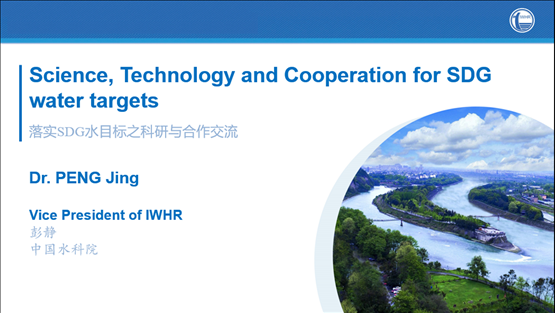
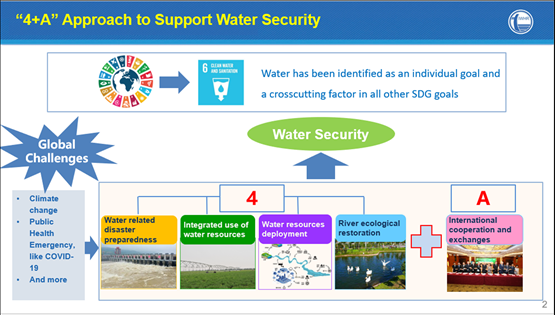
The “4” part in this approach refers to four main areas that IWHR has been focusing on:
1) Flood disaster research. IWHR has developed:
· A National Flash Flood Investigation and Assessment Result Database for China;
· A platform that involves monitoring, forecast and early warning of flash floods, smart forecast and dispatching methods for flood control for rivers and lakes, coordinated control and decision-making for urban water systems, etc.;
· Industrial standards and technical rules for flood control;
· In-depth integration of the water sector with new technologies like digital twining, big data, artificial intelligence, etc.
· The Flash Flood Program (FFP) aiming at building global partnerships for monitoring, forecast, control and research of flash flood disasters;
· Concrete actions to assist Belt-and-Road countries including Pakistan, Thailand and Myanmar to relieve disasters caused by deadly floods.
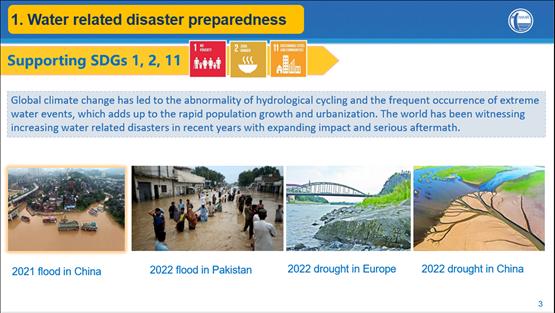
2) Integrated use of water resources. IWHR’s R&D efforts focus on:
· A series of key techniques and facilities for building a water-saving society in China;
· Technical standards for water saving respectively at industry, sector and unit levels;
· Evaluation method for regulation from both supply and demand sides;
· The management system for smart water;
· Techniques for precise irrigation in agriculture;
· Techniques and facilities suitable for Lancang-Mekong countries and related demonstration projects, which are built to assist those countries in securing water supply for local people and realizing SDG 6 (Water and Sanitation).
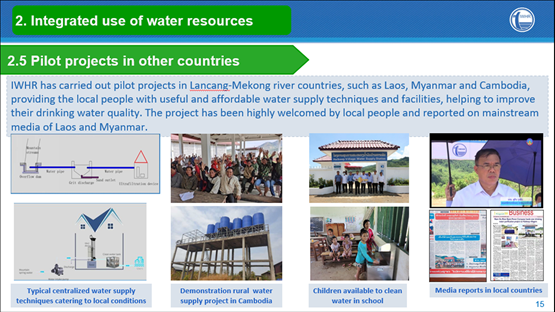
3) Water resources development. IWHR has developed/initiated:
· The nature-society dualistic water cycling model that helps to better understand and manage the whole process of water cycling under changing environment;
· The large-scale water resources dispatching model called GWAS;
· The smart urban water supply management system realizing smart routine checking and daily operation of all specific sites, including the water sources, reservoirs, pump stations, pipelines and water treatment plants;
· International projects to communicate and exchange advanced technologies and philosophies with overseas partners.
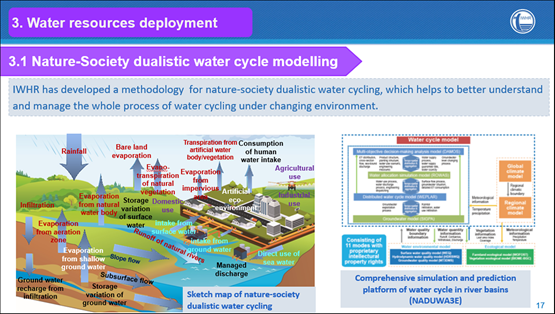
4) River ecological restoration. IWHR’s accomplishments include:
· The conceptual model for river corridor connectivity and an evaluation method of such connectivity;
· A River Happiness Index (RHI) system to evaluate the happiness level of 15 major rivers in the world;
· Joint research with EU partners upon bio-diversity protection of rivers under the framework of the China-EU Water Platform.
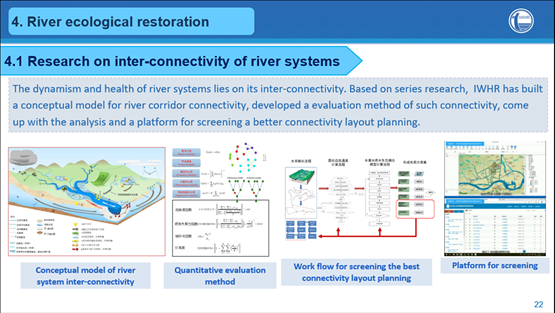
The “A” refers to international cooperation and exchanges, including international training programs to share knowledge and experiences in water-security-related topics, the Water Education Series multiple language versions to help promote water science literacy among children and teenagers worldwide, online seminars and workshops, etc.
Loic Fauchon, President of the World Water Council and Gauden Galea, the Representative of World Health Organization in China, delivered their speeches on the Webinar. Live streaming of the Webinar attracted over 4,500 online viewers from 23 countries. Future international cooperations and exchanges to advance the water-related SDGs were discussed.

